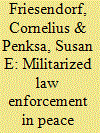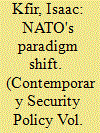|
|
|
Sort Order |
|
|
|
Items / Page
|
|
|
|
|
|
|
| Srl | Item |
| 1 |
ID:
084587


|
|
|
|
|
| Publication |
2008.
|
| Summary/Abstract |
The militarization of law enforcement has been a major feature of post-cold war international security: domestically, at borders and as part of peace operations. In post-war interventions, international military forces are confronted with tasks ranging from crowd and riot control and the arrest of suspect war criminals to the fight against organized crime. This article analyses and explains the militarization of law enforcement in Bosnia and Herzegovina, with a focus on the European Union Force (EUFOR). After taking over from NATO's Stabilization Force (SFOR), which had gradually and reluctantly become involved in law enforcement, EUFOR expanded counter-crime efforts. In its second term, EUFOR scaled down such engagement. We explain these dynamics by pointing to three interrelated factors: the role of individuals, the evolution of regional institutions and changing perceptions of crime and the rule of law.
|
|
|
|
|
|
|
|
|
|
|
|
|
|
|
|
| 2 |
ID:
140337


|
|
|
|
|
| Summary/Abstract |
Although recent years have seen more talk about Article 5 and the need for NATO to stand up to an expansive Russia, NATO states are unlikely to engage in a new Cold War with Russia. Instead the alliance continues to explore its agenda in the post-Afghanistan and post-Crimea period. One answer to these tensions is to develop an agenda stressing human security to counter the pervasive threats of regional instability and terrorism. After reviewing the alliance's Military Concept Against Terrorism (MCAT), the deliberations of the 2012 Chicago and 2014 Wales Summits, and the European Union's Common Defence and Security Policy (CSDP), this article explores two propositions. First, that the vacillating commitment of alliance members who chose to address security issues through EU mechanisms or optional coalitions of the willing threatens NATO's relevance. If NATO's members are unclear about the alliance's agenda and identity, others cannot know what the alliance is willing to do to protect its interests. Second, by developing Military Concept against Terrorism and Smart Defence along a human security framework coupled with maritime operations would enable the alliance to better satisfy the needs of its European members, allowing them to employ NATO to support the EU's Common Defence and Security Policy, and ensure a continued reliance on NATO. As one area where there is a consensus between NATO's European members and the USA, counterterrorism is the most promising field that the alliance can focus on. NATO, therefore, should position itself as a key counterterrorism force, albeit one that is not strictly kinetic.
|
|
|
|
|
|
|
|
|
|
|
|
|
|
|
|
| 3 |
ID:
086167


|
|
|
|
|
| Publication |
2009.
|
| Summary/Abstract |
Because of the importance attached to military operations to destroy al-Qaeda, Pakistan is often viewed in the context of Afghanistan. As a result, events in Pakistan are usually assessed in terms of their effect on US objectives for Operation Enduring Freedom and on the operations of NATO's International Security Assistance Force. Their implications for Pakistan as a whole have been neglected and sometimes poorly analysed. But the well-being and stability of Pakistan is of supreme importance in its own right. This importance needs to be reflected in a sound and coherent strategy towards the country. The formulation of such a strategy requires an informed understanding of Pakistan's history; social, political and economic dynamics; and key personalities and influences. And the strategy needs to be underpinned by resources which are commensurate with the importance of the interests to be protected and advanced. Unfortunately, the customary means of acquiring real-time knowledge of events and personalities - diplomacy, media, commercial and other contacts - have been and still are impeded by the hazardous security situation in much of the country. Without a good understanding, actions taken for tactical purposes may have negative strategic consequences which outweigh the hoped-for benefits, as has occurred on several recent occasions.
The challenges in southwestern Asia need to be considered in three separate but related contexts: Afghanistan, the Afghan-Pakistani tribal belt, and Pakistan. In the present conjuncture, Pakistan is arguably the most important of the three. With nuclear weapons and a huge army, a population over five times that of Afghanistan, and simultaneous security, political and economic crises, it now seems less able, without outside help, to muddle through its challenges than at any time since its war with India in 1971.
|
|
|
|
|
|
|
|
|
|
|
|
|
|
|
|
|
|
|
|
|